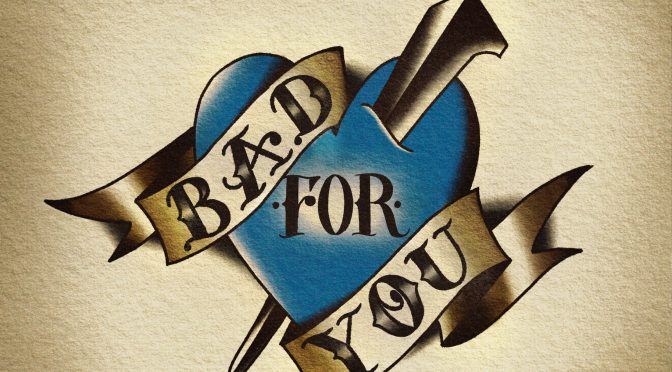Rating: 6.5/10
“I beat my own damn drum, stick out like a sore thumb,” Aubrie Sellers declares on the closing song of her latest album, called “One Town’s Trash.” Truer words were never spoken, as sellers embraces a sound she calls “garage country,” a blending of traditional country themes and sensibilities with garage rock instrumentation. 2016’s New City Blues was an excellent showcase of this style and of Sellers. But it’s a stretch to call most of this new record garage country at all; it’s basically garage rock with a twangy singer and some country textures. In and of itself, this is not a bad thing, and Far From Home is certainly not a bad record, but the style can be overwrought, and it’s a little disappointing after the stellar New City Blues.
However, there’s quite a lot that this album gets exactly right. The garage country approach really enhances some of these tracks, and where it works, it’s excellent to see Aubrie Sellers confidently leaning into her own sound and writing songs that best capture it. “Worried Mind” is the best example of this, where sellers sings of depression and anxiety, and the restless, moody guitars accentuating the song add something darker to the track and further illustrate the turmoil in Sellers’ mind. “Drag you Down” is just simply a jam, and the hard-charging guitars really add to this one also, as Aubrie sings of dragging some poor soul down with her into the depths of misery and despair. This is an extremely catchy track and one that would probably do well on radio if there was any semblance of justice in the format. “Going Places” provides a spacey moment where the style paints a nice picture of the endless rambling described in the song. These three tracks are sequenced together in the heart of the album and collectively provide the strongest showcase of garage country and what makes Aubrie Sellers stick out proudly like a sore thumb.
But too often, the style is just simply overdone. “Lucky Charm” is another catchy number with a smart hook, but it’s unnecessarily weighed down by overproduction. “Glad” has a similar issue; it’s got a great premise, as Sellers sings of being happy that her ex broke her heart because she doesn’t have to go on loving him blindly while he’s being unfaithful, but it’s just too messy to really work. “Drag You Down” works so much better with its tighter arrangement, and “Glad” would have been a standout if they weren’t trying to throw everything and the kitchen sink into the mix. “Troublemaker” would have also packed more of a punch if the band didn’t just totally disintegrate into a chaotic mess as the song comes to a close. That was probably the intended point, given the title of the song, but the fact is that it just makes the track sound cluttered. But the biggest problem with the garage country approach is not really with one song; rather, it’s that by the end of the record, the sound is a little stale, and you feel a bit exhausted after the continuous assault on your ears by all this distortion and grit. They went all in with this sound, and credit to Aubrie Sellers for knowing who she is and sticking to that, and to Frank Liddell for helping her vision come to life, but too often, it’s at the expense of Sellers herself. Inasmuch as this works so well on certain tracks to make Sellers stand out from the crowd, just as often it works against her and distracts from her talent as a vocalist and as a songwriter.
This is made even more apparent by the few times where this record holds back. Some of the best songs of Far From Home come when the production is restrained, and Aubrie’s voice soars to the forefront. The title track opens the album with a fairly sparse, atmospheric approach and makes this simple song about feeling lost and out of place in this world the crown jewel of the whole record. “Run,” although it could have perhaps been helped by another verse to tie everything together, sees sellers in a vulnerable moment of self-reflection, and scaling the production back was the right call here also. “Haven’t Even Kissed me Yet” does go for an extended guitar solo to close the song, but it comes naturally after building throughout, and the vocals are kept front and center, allowing Aubrie sellers to deliver a heartfelt, beautiful vocal performance. But it’s moments like these that serve to make the cluttered, overproduced material all the more frustrating; it feels like this would have been a great record if it were handled with a little more care.
This album is a case where many of the individual songs are better than the sum of their parts. AS a 46-minute exhibition of garage country, it can just be tiring. But when the best moments are isolated, there are some fine tracks here. Aubrie Sellers is an incredible vocalist, and it’s a shame that some of this is ignored on her sophomore effort in lieu of elevating her sound. It’s not a bad album, but it feels like a missed opportunity to be a great one. And it’s not the garage country style itself that makes it disappointing; indeed, tracks like “Worried Mind” prove that this style can be really interesting and unique. It’s the pursuit of being different at the expense of everything else which ultimately makes this record fall short of what it could be. Hopefully, Aubrie sellers can find the right balance on her next project, a balance between the style that makes her unique and the voice that makes her special. When she achieves that balance, as she does in flashes on this record, she achieves something original and exciting and fresh, both inside the country space and for music in general.



